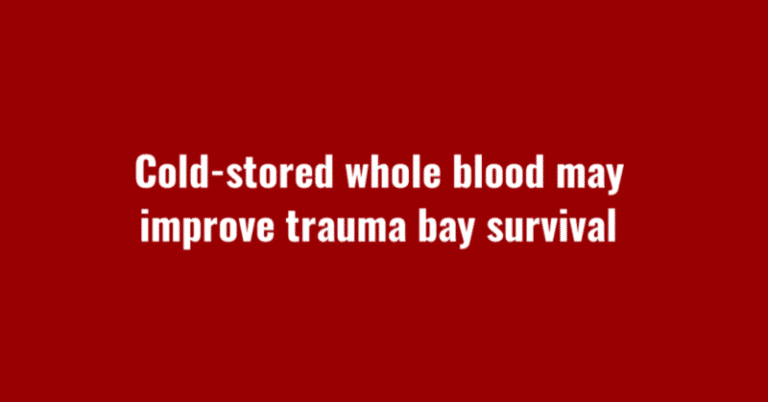Trauma patients who received cold-stored whole blood as their initial blood product were less likely to die in the trauma bay than patients who received standard blood component therapy, according to a new study published in the Journal of Trauma and Acute Care Surgery. The use of whole blood in initial resuscitation did not increase the risk of hemolysis.
The retrospective study examined injured patients in hemorrhagic shock who were treated at one of two verified Level I trauma centers in the U.S. The study included 91 trauma patients who received type-O, low-antibody-titer, cold-stored whole blood (CWB) during their initial resuscitation.
The decision to give initial CWB was at the discretion of the trauma surgeon (based on the study’s clinical criteria), and the decision to continue CWB or switch to BCT was also at the surgeon’s discretion. The CWB patients were case-matched to 182 trauma patients who received standard blood component therapy (BCT) alone.
The researchers found that patients who received CWB initially were more likely to survive their trauma bay resuscitation.
- The trauma bay mortality rate was 2.2% in the CWB group, compared to 8.8% in the standard BCT group.
- The two groups showed no differences in 24-hour mortality, 30-day mortality, total amount of blood products transfused or platelet count.
- At 24 hours, the CWB group had higher mean hemoglobin and mean hematocrit, which suggest a hemostatic benefit.
- No patients in either group showed evidence of hemolysis.
- One patient in the CWB group developed transfusion-associated circulatory overload and recovered.
The use of cold-stored whole blood for injured patients could help simplify the logistics of trauma resuscitation. In addition, previous military research suggests that whole blood resuscitation may provide an overall survival benefit.
“Our study adds to the growing body of literature that, complemented by military [whole blood]data, should shift the standard of care to CWB as the first-line transfusion product for patients in hemorrhagic shock,” the authors concluded.
True benefit of whole blood?
In an accompanying commentary, Martin Schreiber, MD, FACS, said it was unclear why some patients in the study received initial CWB while others received standard BCT. In addition, he noted that the study does not report trauma bay times. “[It] is possible that whole blood patients left the trauma bay earlier and death was just being displaced to a different area,” he wrote.
“The study is interesting and adds to the early growing body of literature concerning CWB,” Dr. Schreiber wrote. “However, like any good study, it raises more questions than it provides answers.”

